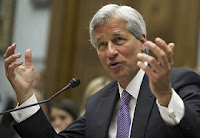(Why Republicans worry about corporate feelings)
-------------------------------------------------------------
By Robert Reich *
Guest blogger / Christian Science Monitor
June 19, 2012
[In the upside-down world of regressive Republicanism, Senator Mitch McConnell thinks proposed legislation requiring companies to disclose their campaign spending would stifle their free speech, a concept Robert Reich finds "bonkers."]
Perhaps you’d expect no more from the Republican leader of the Senate who proclaimed three years ago that the GOP’s first priority was to get Obama out of the White House. But Senator Mitch McConnell’s speech Friday at the American Enterprise Institute in Washington is simply bonkers.
The only reason I bring it up is because it offers an inside look at how the Republican goal of getting rid of Obama is inextricably linked to the Republican Supreme Court’s decision equating corporations with people under the First Amendment, and to the Republican’s current determination to keep Americans in the dark about which corporations contribute what.
In the upside-down world of regressive Republicanism, McConnell thinks proposed legislation requiring companies to disclose their campaign spending would stifle their free speech.
He describes the current push to disclose the sources behind campaign contributions as a “political weapon,” used by the Democrats, “to expose its critics to harassment and intimidation.”
Harassment and intimidation? It used to be called accountability to shareholders and consumers.
Five members of the Supreme Court think corporations are people. Mitt Romney agrees. And now the minority leader of the Senate – the highest-ranking Republican official in America – takes this logic to its absurd conclusion: If corporations are people, they must be capable of feeling harassed and intimidated if their shareholders or consumers don’t approve of their political expenditures.
Hell, they might even throw a tantrum. Or cry. Corporations have feelings.
This isn’t just whacko. It also defies law and logic. What are corporations anyway, separate and apart from their shareholders and consumers? Legal fictions, pieces of paper.
And whom do corporations exist for if not the people who legally own them and those who purchase the products and services they sell?
Clearly, McConnell doesn’t want corporations to be forced to disclose their political contributions because he and other Republicans worry that some shareholders and consumers would react badly if they knew – and thereby constrain such giving.
And the reason McConnell and other Republicans don’t want any constraint on corporate political giving is most CEOs are Republicans who want to use their firms – and the money their shareholders legally own – as secret slush funds for the Republican Party, funneled through front groups like the U.S. Chamber of Commerce and Crossroads GPS.
Such nonprofits have spent significantly more than Super PACs on elections since 2010, according to the Center for Public Integrity and Center for Responsive Politics. Nonprofits have spent $95 million on elections since 2010, while Super PACs, which are required to disclose their donors, have spent $65 million, the Centers found.
Crossroads GPS has disclosed on its tax returns that 23 donors to it have each given $1 million or more to finance its campaign activities so far this year. But Crossroads claims status as a nonprofit under IRS rules – a “social welfare” organization” that doesn’t have to disclose its donors – even though anyone with half a brain knows its overriding purpose is to influence elections.
McConnell and other Republicans conveniently forget secret campaign money was at the heart of the Watergate scandals forty years ago. And that even the Supreme Court in its heinous “Citizens United” decision upheld the constitutionality of disclosure requirements on corporations and other outside groups.
Mitch McConnell wants to give some cover to his Republican colleagues who will be voting later this month or early next month on the bill to force full disclosure of corporate political expenses. But his speech at the American Enterprise Institute doesn’t provide cover. It cloaks the whole Republican enterprise in hypocrisy.
________________________________________
* Robert Reich is chancellor’s professor of public policy at UCLA-Berkley. He has served in three national administrations, most recently as secretary of labor under President Clinton.













